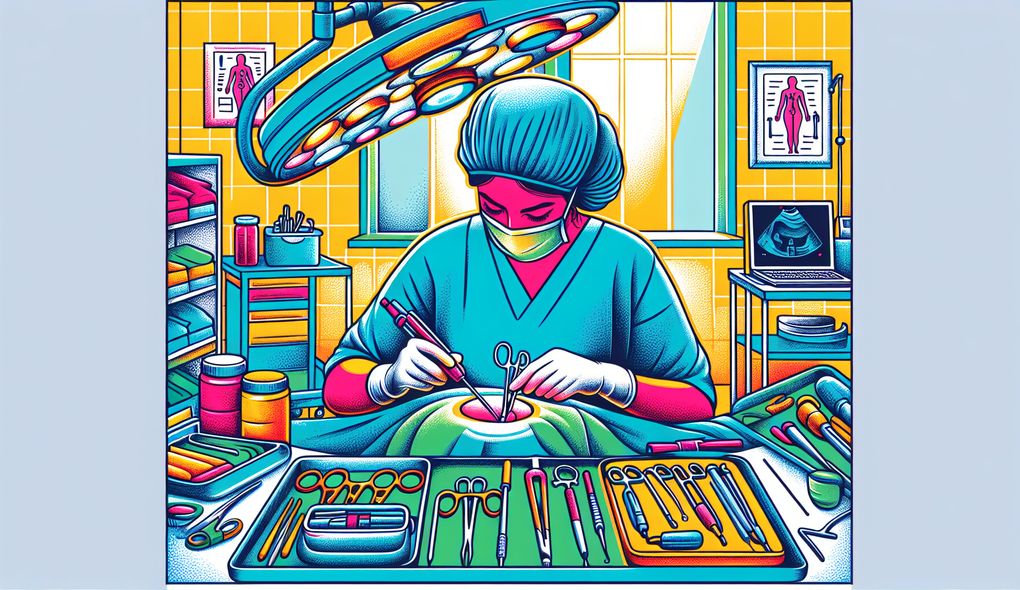How do you manage your workload and prioritize tasks in a high-stress surgical environment?
INTERMEDIATE LEVEL

Sample answer to the question:
In a high-stress surgical environment, managing my workload and prioritizing tasks is essential to ensure the best patient outcomes. I use a systematic approach to prioritize tasks based on urgency, complexity, and patient needs. I start each day by reviewing the surgical schedule, assessing the complexity and time required for each procedure. I then prioritize urgent cases, such as emergencies or patients with critical conditions. I also consider the specific needs of each patient, such as the level of pain or discomfort they are experiencing. Throughout the day, I regularly communicate with the surgical team to coordinate tasks and ensure smooth workflow. If unexpected situations or emergencies arise, I can quickly adapt and reprioritize tasks to address the most critical issues first.
Here is a more solid answer:
In a high-stress surgical environment, managing my workload and prioritizing tasks is crucial to provide the best care to my patients. I have developed a strategic approach that involves several key steps. Firstly, I review the surgical schedule each day and assess the complexity and time required for each procedure. This helps me identify any cases that may require additional preparation or resources. I then prioritize urgent cases, such as emergencies or patients with critical conditions, to ensure they receive immediate attention. Additionally, I consider the specific needs of each patient, such as their level of pain or discomfort, and prioritize their procedures accordingly. Throughout the day, I maintain open communication with the surgical team to coordinate tasks and ensure a smooth workflow. This collaborative approach allows us to address any unexpected situations or emergencies promptly. Furthermore, I constantly monitor the progress of each surgery and maintain meticulous attention to detail and precision in my surgical techniques to minimize risks and optimize outcomes. By effectively managing my workload and prioritizing tasks, I can deliver high-quality care while ensuring patient safety in a high-stress surgical environment.
Why is this a more solid answer?
The solid answer provides more specific details and examples about the candidate's approach to managing their workload and prioritizing tasks in a high-stress surgical environment. It highlights their strategic approach, including reviewing the surgical schedule, prioritizing urgent cases, considering patient needs, maintaining open communication with the team, and ensuring meticulous attention to detail in surgical techniques. The answer demonstrates the candidate's ability to work effectively in a high-stress environment and their commitment to delivering high-quality care. However, it can be further improved by including specific examples from the candidate's past experiences or discussing any innovative techniques or technologies they have utilized.
An example of a exceptional answer:
In a high-stress surgical environment, managing workload and prioritizing tasks require a combination of efficient systems and strong interpersonal skills. To manage my workload, I rely on a comprehensive system that involves proactive planning, effective delegation, and continuous communication. Each day, I review the surgical schedule in detail, considering the complexity and time required for each procedure. I proactively identify potential challenges, such as limited resources or equipment needs, and address them ahead of time. Additionally, I establish clear priorities based on urgency, patient needs, and available resources. This ensures that critical cases receive immediate attention and that resources are allocated efficiently. Alongside managing my own workload, I emphasize effective delegation and collaboration. I trust my team members to handle tasks within their scope of practice, empowering them to contribute their expertise and alleviate my workload. Clear and continuous communication is paramount in a high-stress surgical environment. I maintain open lines of communication with the surgical team, updating them on any changes or priorities. This promotes a shared understanding of the workload distribution, allowing us to adapt and respond swiftly to unexpected situations. Additionally, I make use of technology, such as electronic medical records and surgical planning software, to streamline documentation and enhance communication. Ultimately, my goal is to deliver exceptional care while managing workload and prioritizing tasks effectively in a high-stress surgical environment.
Why is this an exceptional answer?
The exceptional answer provides a more comprehensive and detailed explanation of how the candidate manages their workload and prioritizes tasks in a high-stress surgical environment. It includes specific strategies such as proactive planning, effective delegation, and continuous communication. The answer also mentions the candidate's utilization of technology, such as electronic medical records and surgical planning software, showcasing their ability to adapt and leverage innovative tools. Overall, the answer demonstrates the candidate's exceptional ability to work effectively in a high-stress environment and their commitment to delivering exceptional care. It could be further enhanced by providing specific examples of how the candidate has implemented these strategies in their past experiences.
How to prepare for this question:
- Familiarize yourself with the surgical schedule and understand the complexity and time required for each procedure. This will help you prioritize tasks effectively.
- Develop a systematic approach to prioritize tasks based on urgency, patient needs, and available resources. Practice this approach in your current role or during simulations.
- Enhance your communication and interpersonal skills to effectively coordinate tasks and collaborate with the surgical team.
- Stay updated with advancements in surgical techniques, technologies, and software platforms. Familiarize yourself with electronic medical records and surgical planning software.
- Reflect on your past experiences in a high-stress environment and identify specific examples of how you managed your workload and prioritized tasks. Be prepared to discuss these examples during the interview.
What are interviewers evaluating with this question?
- Ability to work effectively in a high-stress environment
- Meticulous attention to detail and precision in surgical techniques

